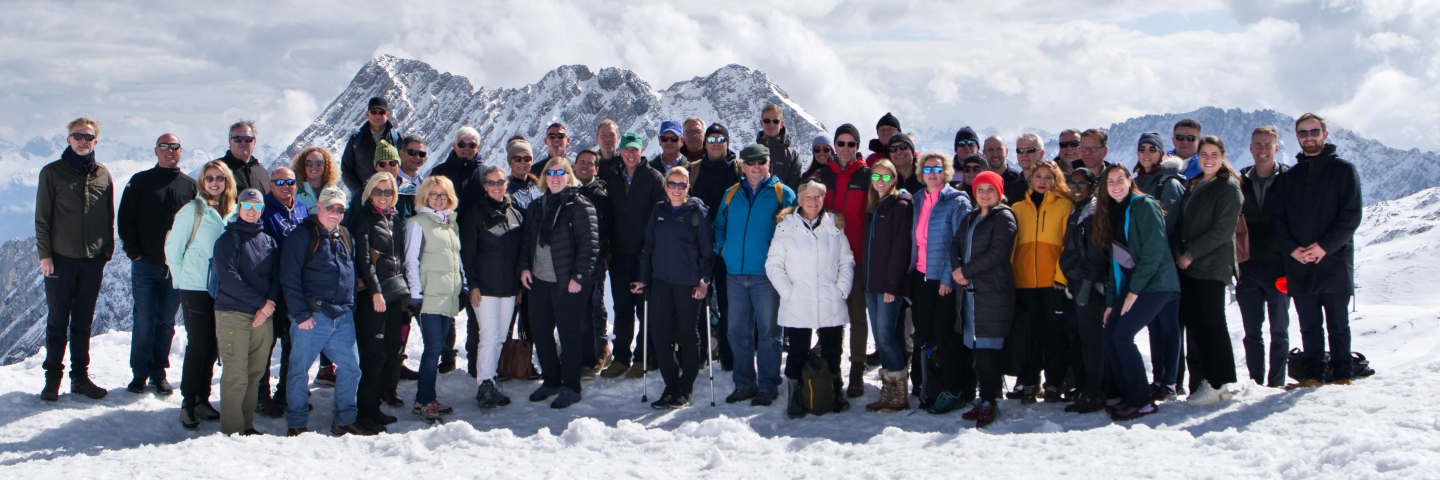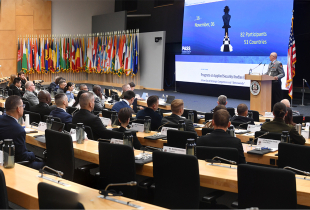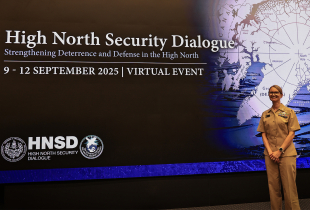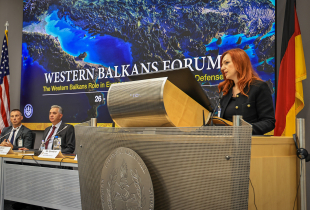
Regional Centers Co-Host Arctic Security Seminar
GARMISCH-PARTENKIRCHEN, Germany – The George C. Marshall European Center for Security Studies and the Ted Stevens Center for Arctic Security Studies co-hosted a High North Security Dialogue seminar on the Marshall Center campus in Garmisch-Partenkirchen Sept. 17-20.
“There’s a storm on the horizon - the most important time to prepare is now,” said keynote speaker Ambassador Kenneth Braithwaite, former Ambassador to Norway and former Secretary of the Navy, who spoke about the geopolitical crisis facing the Arctic and the need to deepen collaboration on strengthening defense and deterrence efforts in the region.
During the week-long event, more than 50 senior security policy makers, practitioners, and academic experts met to assess strategic challenges and opportunities within the European High North and broader Arctic region.
A Divided Arctic
This year’s theme, “A Divided Arctic: Is an Ice Curtain Emerging?” examined the emerging Sino-Russian dynamic, trans-Atlantic cooperation, integrated deterrence, and defense of the High North. Seminar participants focused on the impact of climate change, economic development, and innovative technology on the security and stability of the region.
“We put together an academically rigorous program this year, bringing in a lot of high-level speakers as well as a lot of experts,” said Navy Cmdr. Rachael Gosnell, Military Professor of Strategic Security Studies at the Marshall Center, adding that studying the Arctic environment is a unique challenge due to its evolving security environment as an emerging frontier on NATO’s northern flank. “Study panels and discussions integrated many of the elements of that evolving strategic environment including economic security, climate change, human security elements, and social developments,” Gosnell said.
In its seventh year, the High North Security Dialogue, previously titled European Security Studies – North, built upon the implications of Russia’s invasion of Ukraine, as they applied to the Arctic region. The High North seminar aimed to develop concrete strategies to deepen existing alliances, produce actionable policy recommendations, better understand the High North, and anticipate, adapt, and proactively address challenges of the future.
European focus on the Arctic
"European strategic culture is evolving as we are facing the continued and direct threat emanating from Russia,“ said Dominik Mutter, German Envoy to the Arctic. “The German government has endorsed new Arctic policy guidelines, demonstrating the region’s importance to our security. They are part of our commitment to the transatlantic Alliance that is as strong as ever."The HNSD brought together Arctic nations and like-minded stakeholders, welcoming notable Arctic experts, including Rear Adm. Tim Henry, Deputy Commander, NATO Allied Joint Forces Command Norfolk; Claude Veron-Reville, European Union Special Envoy for Arctic Matters; Dr. Marc Lanteigne from UiT Arctic University of Norway; Denmark’s Brig. Gen. Poul Primdahl, Deputy Commander Joint Arctic Command; Rear Adm. Andrew Sugimoto, U.S. Coast Guard, Eleventh District Commander; Dr. Michael Paul, German Institute for International and Security Affairs (SWP); Anna Wieslander, Director, Atlantic Council Northern Europe; Ambassador Marie-Ann Coninsx, Former EU Ambassador to the Arctic; Ambassador Piotr Rychlik, Ph.D., Ambassador for Arctic Affairs and Former Polish ambassador to Finland, and other experts.
Participants also engaged with Dr. Rebecca Pincus, Director of the Polar Institute at the Wilson Center in Washington D.C., and Alaska Senator Lisa Murkowski during their virtual presentations.
“The question of whether an Ice Curtain is emerging is a very sophisticated theme for this year’s High North Security Dialogue,” said Dr. Pincus, adding that a path forward for climate change discourse was critical and would involve a complex approach to diplomacy, and that a fully isolationist approach to addressing climate change could be detrimental to the earth’s climate.
Climate change: Arctic impact
Warming at a pace three to four times greater than the average global rate, the Arctic region is currently experiencing dramatic impacts from climate change according to experts. This warming trend presents significant global implications, in addition to potential for causing considerable local and regional challenges. Seminar participants were able to witness these climate change effects first hand during a visit to Zugspitze, Germany’s highest mountain peak, which sits at 2,962 meters, or 9,718 feet above sea level. Zugspitze has two of the last glaciers in Germany, the Northern Schneeferner and the Hoellentalferner. In 2022, due to global warming, the Southern Schneeferner at plateau Zugspitze lost its status as a glacier and is now categorized as “dead ice”.
“It’s really important that we have an experiential hands-on learning opportunity and there’s no better place in Germany to come than to the top of Zugspitze,” said Professor Gosnell. “It’s really foundational to understanding the Arctic security environment.”
Participants received an informative briefing from one of the climate scientists working at the Schneefernerhaus facility atop Zugspitze that included ways Germany and the Alps have been impacted by a changing climate and an overview of the research the staff conducts in the Arctic.
Concluding the seminar, retired Brig. Gen. (Ret.) Rolf Wagner, German Deputy Director of the Marshall Center, praised the output-oriented focus on building resilience, advancing Trans-Atlantic cooperation, countering hybrid warfare, strengthening deterrence, and the defense of NATO’s Northern Flank.
“What we have accomplished here can’t be measured – the connections you forge here, your determination to make a difference and contribute to global security, is truly appreciated,” Wagner said.
The joint planning and execution of the HNSD program by both the Marshall Center and the Ted Stevens Center ensures a comprehensive approach to better understand the Arctic, both as a geographical and climatic space, as well as the unique political, geophysical, and socio-economic conditions of its sub-regions. A lighthouse project of cross-regional center collaboration under the auspices of the U.S. Department of Defense, the partnership seeks to translate the findings of its seminars into actionable recommendations for policymakers.
-----
The George C. Marshall Center for Security Studies, founded on June 5, 1993, is a renowned international security and defense studies institute. A bilateral partnership between the U.S. and Germany, it is a lasting cooperation that promotes dialogue and understanding among the nations of North America, Europe and Eurasia. In 2023, the Marshall Center marked its 30th anniversary, re-emphasizing its commitment to carrying Marshall’s vision, an enduring legacy that continues through the security education initiatives of the Center.


